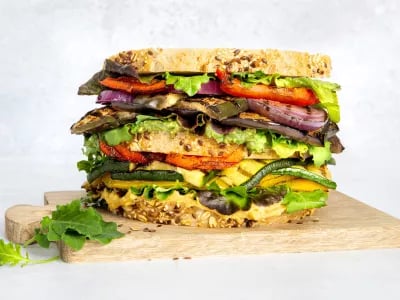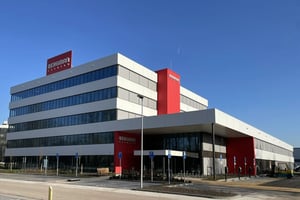HAK is well-known for its vegetable and fruit preserves, stored in glass jars and so-called stand-up pouches. Far fewer people are aware that HAK acquired a company specialised in refrigerated vegetable preparations in 2017. Their production facility in Den Bosch, the Netherlands, was recently renovated, giving HAK access to a state-of-the-art production facility for fresh vegetable solutions adhering to the highest standards of quality and hygiene. Rogier Hilkes, director of HAK Fresh, talked to us about the emerging opportunities.
What makes this investment worthwhile?
Hilkes: “Peter van Halder's last production site, which we acquired in 2017, no longer met our standards, and it didn't make us stand out in the food service and catering industry. So, we decided to build a brand-new fresh vegetables factory, with both hot and cold kitchens operating in accordance with the highest standards of care and risk management. In addition, we are compliant with the highest requirements of quality and hygiene: it's all BRC AA certified. Now we're ready to enter a fast-growing market of vegetable solutions, such as pizza toppers, salad boosters and bread toppings. Our clients are large food service providers like gas stations, in-flight and corporate catering services providers, and franchises. We also deliver ready-to-(h)eat prepared salads and meal components with vegetables as a main ingredient to supermarkets."
What sets HAK Fresh apart in this market?
Hilkes: "Since we now have access to a technologically state-of-the-art production facility, we can offer above-average shelf life of four days, or up to ten days after additional heat treatment. Moreover, all products were processed in a sterile environment in accordance with the HAK Green Kitchen principles, so 100% naturally, without preservatives. The cutting plant was completely renovated, which means that the factory is extremely flexible, and customers can choose from a very wide range of cuts – cubes, slices, strips, julienne, and so on – as well as packaging that fits specific product and customer needs. And since we offer a wide range of preparations – from blanched and roasted to grilled and marinated – we can spare our customers elaborate culinary labour while enriching their meals with fresh, tasty, and healthy vegetable solutions of a very consistent quality."
Is HAK Fresh a supplier of intelligent and high-value semi-finished products?
Hilkes: "You could put it that way. Customisation is really an essential condition to success, nowadays. Because we offer both large and small packages, we can provide our customers with exactly the amount they need. That, in turn, helps them reduce waste in their kitchens. Meals in on-site kitchens or pantries are increasingly assembled, rather than prepared on the spot. That enables employees to assemble a healthy and delicious meal even without culinary training, using fresh ready-made ingredients of optimal quality. All things on-the-go are our domain: gas stations, airports, train stations, in-store fresh kitchens, and the supermarket shelves stocked with fresh and healthy meals for customers to take home.
Do you feel like the pandemic has played into your hands? After all, consumers are buying more meals 'on the go' than ever before.
Hilkes: "The pandemic has reinforced a trend that's been going on for a while now. Consumers pay more and more attention to their health, and they expect their snacks and 'on-the-go' meals not just to taste good, but also to be composed of healthy, plant-based and colourful ingredients."
Why did you discontinue a number of initiatives that Peter van Halder used to run, such as producing meals and soups and delivering unprocessed vegetables to healthcare institutions, for example?
Hilkes: "Those are never easy decisions, but we really wanted to go in another direction. We think we can deliver more added value through the production of green specialties, and we accept that we'll temporarily lose part of our revenue that way. The potential of our new solutions is many times larger, and we're looking ahead to the future of eating. It's our mission to make people eat more vegetables, and so we aim to be a part of multiple meals across the day – and not just the traditional HAK dinner. The new fresh vegetable solutions of HAK Fresh enable us to move further in that direction."
There's a lot of expertise at HAK Fresh when it comes to product development. Are you planning to market that, as well?
"It's true that we developed this new production site by means of expertise and professionalism that took us many years to accumulate. Building on that foundation allows us to develop new products in a process of co-creation with customers. Consider new concepts like vegetable tapas, salad pots or pre-grilled and pre-roasted oven vegetables. We expect these will be in high demand the coming years, since, as I mentioned, consumers are increasingly moving toward a more conscious and plant-based diet."
And finally: will we see HAK Fresh products appear under the HAK brand in the supermarket fresh section?
Hilkes: "Let me put it this way: it would be a logical next step, but we're really planning to take our time and learn from all the experiments we're doing right now. Our priority is that we roll out the HAK fresh proposition for food service and continue exploring with supermarkets how we can help them add value to their product range by delivering fresh vegetable concepts that they can present to their customers. Our primary focus is to become a major player in the fresh produce department and to support our customers with product development and category management."













